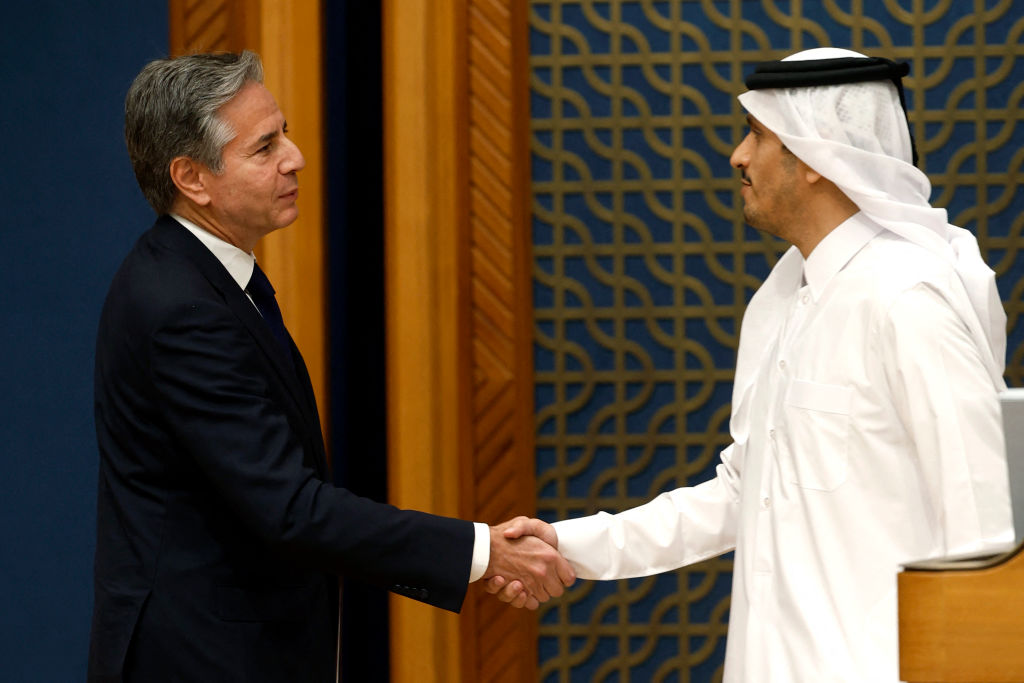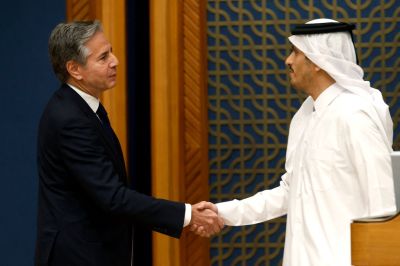Happy Tuesday! We would like to take a moment to pay our respects to Bobi, a 31-year-old Rafeiro do Alentejo who passed away this week in the Portuguese village of Conqueiros as the world’s oldest dog. Bobi’s owners believed the secret to his record-setting longevity was his exclusive diet of watered-down human food—an experiment your Morning Dispatchers will probably not be conducting for themselves.
Quick Hits: Today’s Top Stories
- After more than a year of negotiation with the Nordic state, Turkish President Recep Tayyip Erdoğan sent a measure to his nation’s parliament on Monday that would ratify Sweden’s bid to join NATO. It’s not clear why Erdoğan has advanced the ratification now—after refusing to do so over complaints that Stockholm was too lax in addressing threats posed by the Kurdistan Workers’ Party (PKK), a Kurdish terror organization—or how long approval in parliament may take, with no vote yet scheduled. Hungary is the only other NATO member which has not yet ratified Sweden’s accession to the consensus-based alliance.
- A Russian court on Monday extended its detention of journalist Alsu Kurmasheva—a Prague-based dual U.S. and Russian citizen who works for Radio Free Europe/Radio Liberty—until December. Kurmasheva was first detained in June after returning to Russia for a family emergency, and was charged last week with failing to register as a “foreign agent.” She is at least the second American journalist the Russian government has arrested since its invasion of Ukraine last year, following the detention of Wall Street Journal reporter Evan Gershkovich in March.
- Pentagon spokesman Brig. Gen. Patrick Ryder said the U.S. would “hold Iran responsible” for several drone attacks against U.S. forces in Iraq and Syria over the last week, though Ryder said the U.S. did not have evidence Tehran had “explicitly ordered” the drone strikes and did not say whether there would be retaliation against Iran. The spate of drone strikes came after Hamas, an Iran-backed terror organization, began its attack on Israel on October 7, killing 1,400 Israeli civilians. Axios reported Monday the Pentagon had sent Marine Corps Lt. Gen. James Glynn—who was involved in the fight against ISIS in Iraq—and several other U.S. military officers to Israel to advise Israeli Defense Forces (IDF) leadership on its operations against Hamas in Gaza.
- Hamas on Monday released two elderly Israeli women whom the group abducted from Kibbutz Nir Oz on October 7. Nurit Cooper and Yocheved Lifshitz—who were both taken with their husbands who have not yet been released—were reportedly set free on humanitarian grounds after mediation by Egypt and Qatar. The two were the second pair of hostages to be released—out of more than 200 currently believed to be in captivity in Gaza—after a mother and daughter, American citizens Judith and Natalie Raanan, were freed on Friday.
- Democratic Sen. Bob Menendez of New Jersey pleaded not guilty in a New Jersey court on Monday to the charge that he conspired to act as a foreign agent for Egypt. The allegation was part of a superseding indictment against the senator, who—along with his wife and several businessmen—was charged with bribery last month. A trial date has been set for May.
- The United Auto Workers (UAW) union announced Monday it was expanding its ongoing strike against the “Big Three” U.S. auto companies—Stellantis, General Motors, and Ford—to include shutting down Stellantis’ largest plant, which is in Sterling Heights, Michigan. The additional 6,800 UAW workers—who manufacture RAM 1500 trucks—brought the total number of striking members to about 40,000 since the strike began on September 15. The strike at the Stellantis plant was a response to a deal offered Friday, which Shawn Fain, the union’s president, argued did not match the contracts proposed by Ford and GM.
The Middle East’s Middleman

The average American might know the tiny Gulf state of Qatar best for its role in international sports: The nation hosted a Formula One Grand Prix race earlier this month, and in 2022, it became the first Arab country to host the World Cup. But the emirate has taken on an outsized role in the Israeli-Palestinian conflict in recent weeks, too, as a partner to Western nations working toward the release of the more than 200 citizens believed to be held hostage in Gaza by Hamas ahead of an imminent ground invasion by Israel.
On Friday, two U.S. citizens—Judith and Natalie Raanan, a mother and her 17-year-old daughter—became the first pair of hostages released by Hamas after the terrorist organization’s October 7 rampage. Negotiations between Hamas and Qatar reportedly played a crucial role.
Yesterday, Hamas released two additional hostages—Yocheved Lifshitz and Nurit Cooper, both elderly Israeli women—though both those women’s husbands are still being held prisoner. “The war is not yet over,” Lifshitz’s daughter said in an interview on Monday. “Neither is my personal war, until everyone returns.” According to the Israeli Defense Forces (IDF), Hamas terrorists abducted 222 people during its attack earlier this month.
That group includes as many as 10 U.S. citizens, and the releases thus far have reportedly led American officials to advise Israel to delay a ground invasion of Gaza as negotiations continue—an outcome that former U.S. National Security Adviser John Bolton recently suggested was motivating Hamas’ decision to negotiate. Secretary of State Antony Blinken dodged the question in an interview with Face the Nation on Sunday. “There are many, many Israelis who are hostages and of course, hostages from other nationalities,” he said. “We’re working to do everything we can, using whatever levers, partnerships, relationships we have to get them out. Israel is doing the same. But in terms of what we’re talking to Israel about with regard to their military operations, it really is focused on both how they do it, and how best to achieve the results that they seek.” Israeli officials have denied reports of U.S. pressure to delay the campaign in Gaza.
The American and Israeli releases were thanks in no small part to Qatar’s mediation with Hamas, and U.S. officials have praised the country’s efforts. “We are very appreciative of the assistance that we got from the government of Qatar to make sure that they could get out,” Blinken said, referring to the freed Americans. President Joe Biden also thanked the country.
The Gulf state has traditionally played the role of mediator between terror groups that maintain lines of communication with the Qataris and governments—like the U.S.—that officially refuse to negotiate with terrorists. The oil-rich nation—the emirate has the sixth-highest GDP per capita in the world—is a major funder of Hamas, at times providing $30 million per month in aid to Gaza. The money, approved by Israel, is used to provide economic relief to the poorest Palestinians in Gaza, purchase energy for electricity, and pay the salaries of Hamas’ government employees. Many of Hamas’ senior political leaders reside in Doha, Qatar’s capital, including Ismail Haniyeh, the group’s exiled leader. The emirate also has alleged ties to the Syrian Al-Qaeda affiliate Al-Nusra Front, likely contributing to Qatar’s successful role in the release of dozens of hostages held in Syria. More recently, Qatar has also helped negotiate the release of Ukrainian children held by Russia.
“At the moment, they’re in advanced negotiations to try to release as many hostages as possible in exchange for 1) more humanitarian aid going into Gaza, 2) a softer U.S. position on some of the issues that emerge, and perhaps de-escalation more broadly,” Ayham Kamel, head of Middle East and North Africa research at Eurasia Group, told TMD. “They’ve been positioning themselves geopolitically to play that mediator role. It’s not on one issue or one country, and in a lot of cases, they have succeeded.” The United Kingdom and Canada, too, are working with Qatar to secure the release of their citizens held captive by Hamas.
The U.S. has remained more or less content to strengthen relations with Qatar despite its ties to terror groups, designating the emirate a major non-NATO ally in January 2022. Qatar served as the mediator between the U.S. and the Taliban in talks leading up to the American withdrawal from Afghanistan in 2021, and provided a crucial layover for nearly half of the 124,000 people airlifted out during that chaotic U.S. evacuation. And just last month, Qatar helped mediate a prisoner exchange between Iran and the U.S. to secure the release of five American citizens in a deal that included the controversial release of $6 billion in oil profits to Iran—and then after Hamas’ deadly attack in Israel, Qatar and the U.S. came to a “quiet understanding” to block Iran’s access to those funds, citing Tehran’s long-standing support of the terrorist group. “When push comes to shove, they’ll integrate Western interests of a critical manner,” Kamel told TMD.
Qatar has functioned as more than an intermediary for Western negotiations, too. The nation is home to the largest U.S. military base in the Middle East—Al Udeid Air Base, the forward headquarters of U.S. Central Command—and has built up extensive soft power ties with the U.S., spending hundreds of millions of dollars to host six American universities (including Cornell, Georgetown, and Northwestern) in its Education City. Qatar has also spent tens of millions of dollars on a sophisticated Washington influence campaign.
Yet Qatar’s position (and rhetoric promoted by its state-funded news organization, Al Jazeera) on Hamas and other Islamist groups in the region makes the country an odd bedfellow for the U.S. For example, a statement from the Qatari foreign ministry on the day of Hamas’ attack held Israel “solely responsible for the ongoing escalation due to its continuous violations of the rights of the Palestinian people.”
The duplicity is by design. “They try to hide their connections to [the] Taliban and Hamas,” Hussain Abdul-Hussain, a research fellow at the Foundation for Defense of Democracies, told TMD. “Whenever we accuse them that [they’re] hosting these guys or [they’re] supporting these guys, they say, ‘No, we’re only brokering, this is diplomacy.’”
This dual-sided dialogue is par for the course when dealing with Qatar. “It’s a very double-faced game that they play all the time,” Abdul-Hussain added. “They’re a very small nation, and they do it to gain leverage, and they enjoy the spotlight of being the brokers and diplomacy just like the spotlight of hosting the World Cup.”
But the rules of the game could potentially shift. The Biden administration has framed Hamas as another ISIS, upping the cognitive dissonance surrounding a U.S. ally hosting both American college students and terrorist leaders. For now, U.S. officials have sidestepped questions about America’s stance on Qatar’s relationship with Hamas political officials. “All I can say with regard to Qatar is, in this instance, we very much appreciate their assistance,” Blinken told reporters at a press conference on Friday. “Beyond that, I really can’t say because, again, we want to focus on making sure that we’re getting those who remain hostage back home and with their loved ones.” A State Department readout of a call this weekend between Blinken and Mohammed Bin Abdulrahman Al Thani, Qatar’s prime minister, said the pair “reaffirmed the strategic partnership between the United States and Qatar.”
In light of this month’s Hamas attack, some Israeli officials are publicly calling for a reckoning with the Gulf state. “Qatar can no longer speak in a modern Western voice, while actively supporting medieval actions and ideologies,” Ron Prosor, Israel’s ambassador to Germany, wrote in an op-ed last week. “Qatar must decide: Does it forswear terror, cut off the spigot to Hamas, and extradite Hamas’ leadership to the West for trial? Or does it maintain course, underwrite global terror, intimidate, and hack Western officials, and host a few big-ticket sports competitions as distractions?”
The U.S. and other allies are unlikely to shift their policies toward Qatar in the middle of the current hostage crisis. “They’re useful at this stage,” said Kamel. “Where the policy will be down the line, I think it will be in a different place. But for now, it’s about getting the hostages out.”
Worth Your Time
- What if the story we tell ourselves about those who support restrictions on abortion is not quite right? In his Graphs About Religion newsletter, political scientist Ryan Burge explains two misconceptions about people in the pro-life movement. “Views of abortion certainly track with things like political partisanship but it’s not a perfect correlation,” he writes. “The political landscape of the United States is just a lot muddier than that. The Nationscape Survey is huge—over 477,000 respondents. It poses a number of statements about abortion. One of the narratives that one hears often in the abortion debate is that pro-life folks only care about babies until the moment they are born. The implication here is that these folks are conservative Republicans who don’t support policies that make life a bit easier for folks at the lower end of the socioeconomic spectrum. Well, is that really true? I divided the sample into those who favored a proposal to never permit abortion and those who favored a proposal to always permit abortion. I calculated how they feel about a whole host of issues that run the gamut from fiscal to foreign policy. The narrative really falls apart in this analysis.” Among those who would totally ban abortion, “67 percent favor debt free college. 77 percent favor paid maternity leave. 67 percent favor raising the minimum wage to $15/hour. The share of Americans who are pro-life and want a smaller social safety net just isn’t that big. The idea that there’s just tens of millions of Americans who want a woman to have a baby then don’t support the government making it easier to raise that child finds no support in this data. Lots of pro-life Republicans do want to raise the minimum wage and offer some type of paid maternity leave. That narrative hasn’t really caught on in the larger discourse.”
Presented Without Comment
New York Times: Editors’ Note: Gaza Hospital Coverage
“The early versions of the coverage—and the prominence it received in a headline, news alert and social media channels—relied too heavily on claims by Hamas, and did not make clear that those claims could not immediately be verified. The report left readers with an incorrect impression about what was known and how credible the account was.”
Also Presented Without Comment
NBC News: Trump Denies Telling “Red Haired Weirdo” Mar-a-Lago Billionaire About Classified Info
Toeing the Company Line
- In the newsletters: Kevin argued (🔒) Biden’s “Buy American” economic strategy is based on a myth, the Dispatch Politics team interviewed the Maricopa County, Arizona, election recorder who’s bucked election deniers, and Nick picked a fight (🔒) with Liz Cheney—and our own Steve Hayes—over Kevin McCarthy.
- On the podcasts: Sarah and David take on Sidney Powell’s guilty plea, the Supreme Court’s tech-focused term, and various gun cases on Advisory Opinions, while Sarah and Steve head to The Skiff (🔒) for an extended conversation about why mainstream outlets keep screwing up their Israel coverage.
- As a reminder, The Skiff (🔒) is a one-stop destination for all of our bonus podcast content! Available for paying Dispatch members only, this feed will host audio versions of Dispatch Live, the Dispatch Book Club, High Steaks, Q&As with Jonah, extended debates between hosts, and a whole lot more. Click here for more information—including a how-to video from Jonah, the most tech-savvy person on staff—about how to add The Skiff to your podcast player of choice.
- On the site today: Stirewalt comments on the House Republicans fiasco, and Marvin Olasky writes about Britney Spears, People magazine, and post-abortive trauma.
Let Us Know
Should the U.S. continue to work with Qatar—or other nations that work with and support terrorist organizations—to advance our own national interests?
Click here for more coverage of the war in Israel.








Please note that we at The Dispatch hold ourselves, our work, and our commenters to a higher standard than other places on the internet. We welcome comments that foster genuine debate or discussion—including comments critical of us or our work—but responses that include ad hominem attacks on fellow Dispatch members or are intended to stoke fear and anger may be moderated.
With your membership, you only have the ability to comment on The Morning Dispatch articles. Consider upgrading to join the conversation everywhere.